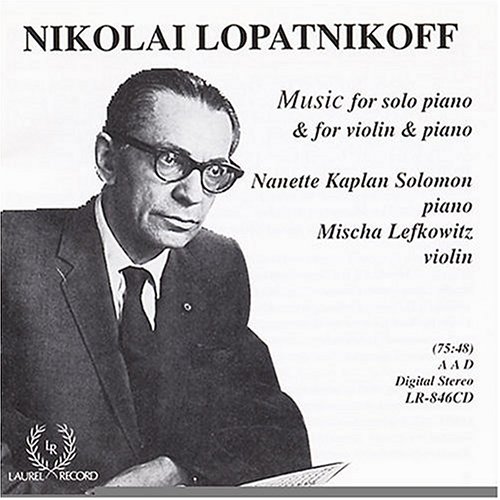 Teadus ja Kunst
Teadus ja KunstНаука и Искусство
Science and Arts
 Teadus ja Kunst
Teadus ja Kunst
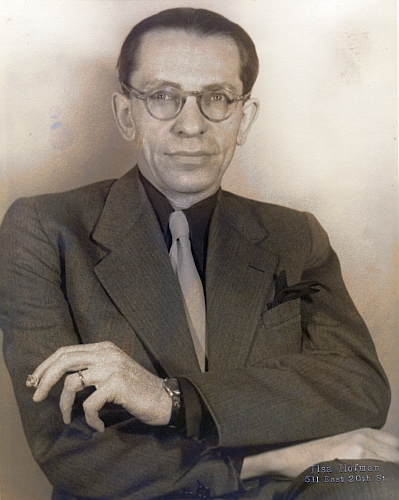 Born in what is now Tallin, Estonia, Lopatnikoff studied piano and theory at the St Petersburg Conservatory until 1917. Like so many Russians of this period, he fled the civil unrest of St. Petersburg and the ravages of a county fighting untenable wars for more peaceful locales. After studying theory at the Helsinki Conservatory between 1918 and 1920, he took up civil engineering at the Technische Hochschule, Karlsruhe. While pursing his technical education, Lopatnikoff also studied composition with Ernst Toch. Among his early works are the Piano Concerto no. 1, op. 5, the Second Concerto, op. 15 and the Symphony no. 1, op. 12. This last work was performed by major orchestras both in Europe and the United States, and was taken on tour by the Philadelphia Orchestra in 1932.
Born in what is now Tallin, Estonia, Lopatnikoff studied piano and theory at the St Petersburg Conservatory until 1917. Like so many Russians of this period, he fled the civil unrest of St. Petersburg and the ravages of a county fighting untenable wars for more peaceful locales. After studying theory at the Helsinki Conservatory between 1918 and 1920, he took up civil engineering at the Technische Hochschule, Karlsruhe. While pursing his technical education, Lopatnikoff also studied composition with Ernst Toch. Among his early works are the Piano Concerto no. 1, op. 5, the Second Concerto, op. 15 and the Symphony no. 1, op. 12. This last work was performed by major orchestras both in Europe and the United States, and was taken on tour by the Philadelphia Orchestra in 1932.
It was, however, Lopatnikoff's pair of pieces for mechanical piano in 1927 that in turn afforded him a lifetime of musical endeavor instead of engineering. Aaron Copland heard Two Pieces and brought them to Serge Koussevitzky's attention. The conductor commissioned an orchestration of one of the pieces, played the resulting Introduction and Scherzo, Op. 10 in 1928, and offered Lopatnikoff a publication contract. There began a stormy but fruitful relationship between the two men that continued to the end of Koussevitzky's life. The Koussevitzky Foundation subsequently commissioned and the Boston Symphony premiered several of Lopatnikoff's new works.
After residing in Berlin and London as a professional composer, soloist and recitalist, Lopatnikoff immigrated to the United States in 1939 and attained citizenship in 1944. In addition to composing, Lopatnikoff's teaching appointments included positions at Hartt College, Westchester Conservatory, and finally at the Carnegie Institute of Technology (later Carnegie Mellon University) as professor of composition. He retired from Carnegie Mellon in 1969 and moved to New York, where he resided until his death in 1976."
......................
Note by Brian K. Doyle
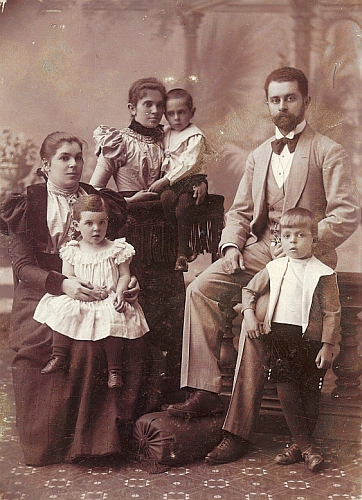
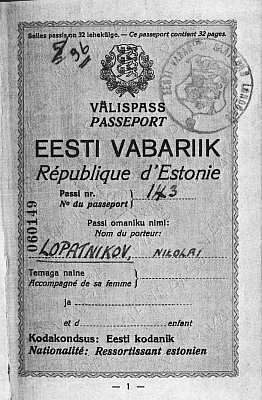
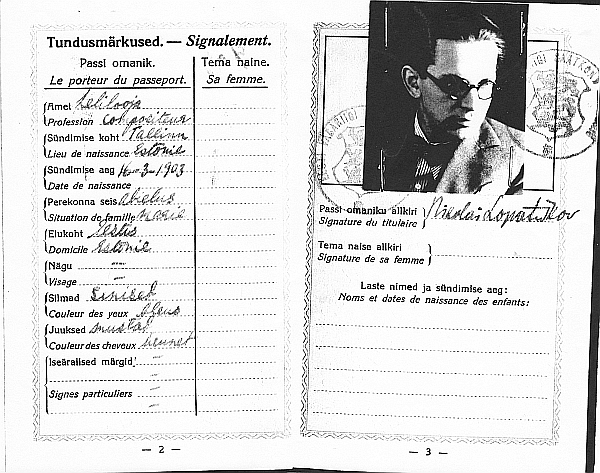
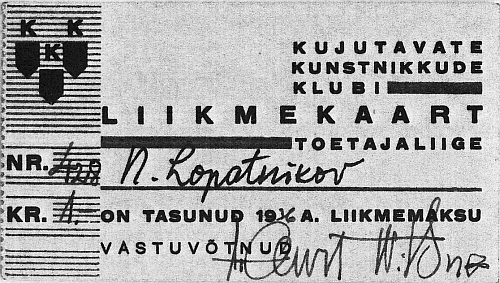
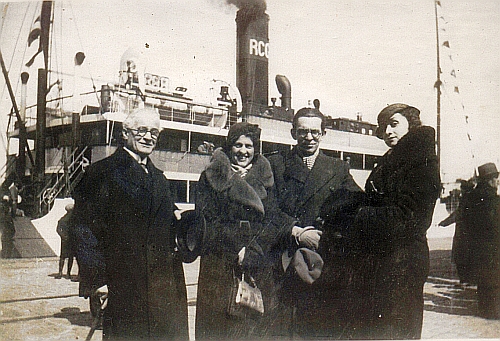
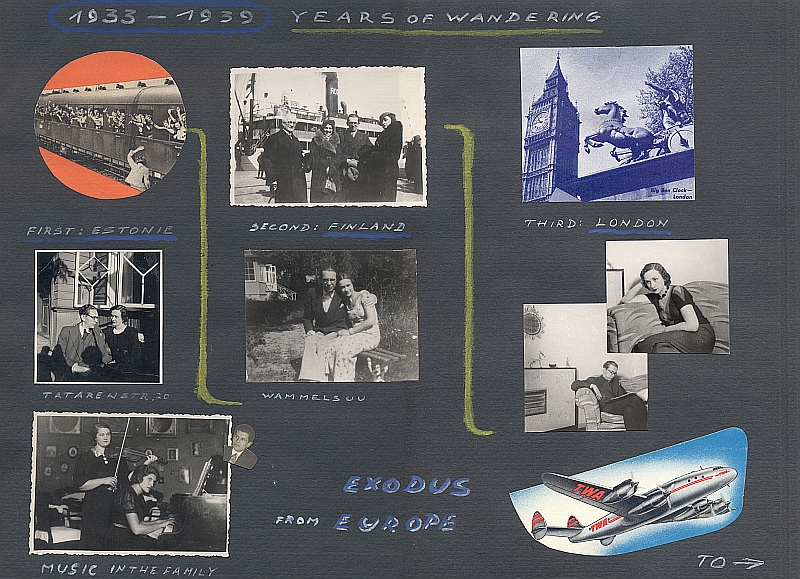
| 1903 Mar 16 | Nikolai [Nikolaĭ] Lvovich Lopatnikoff is born in Reval, Russia (now Tallinn, Estonia), the youngest of four children of Leo Lopatnikoff and Ida Feitelberg. |
| 1907 (circa) | The Lopatnikoff family moves to St. Petersburg, Russia, where Nikolai begins his musical studies in piano and theory at the Conservatory. |
| 1917 Nov | The family moves to Helsinki, Finland, following the Russian Revolution. Nikolai attends high school there, and continues his theory studies with Erik Furuhjelm. |
| 1920 | The family moves to Heidelberg, Germany, where Nikolai continues his musical studies with Hermann Grabner. |
| 1921 | Begins private studies in composition with Ernst Toch and Willy Rehberg in Mannheim, Germany. |
| 1923 | May 16 Enrolls at the Badische Technische Hochschüle in Karlsruhe, Germany, to begin civil engineering studies. |
| 1925 Nov 3 | Première of Concerto no. 1 for piano and orchestra in Cologne, Germany, with Hans Bruch as soloist. |
| 1926 | Marries Eleanore Lashchinsky in Strasbourg, France. The couple settles in Karlsruhe. |
| 1927 Jun 28 | Graduates from the Badische Technische Hochschüle; however, after his first compositions meet with critical acclaim, he decides to concentrate on a career in music. He begins concertizing throughout Europe as a pianist. |
| 1927 | Meets Serge Koussevitzky through Aaron Copland at a music festival in Baden-Baden, Germany, at which the Scherzo and Toccata for mechanical piano is performed. Koussevitzky commissions an arrangement of the Scherzo to be performed by the Boston Symphony Orchestra the following year. |
| 1928 | Moves to Berlin. |
| 1929 Jan 9 | Première of Symphony no. 1 in Karlsruhe. Later this year Lopatnikoff is awarded the Belaïeff Prize in Paris for his String Quartet no. 2. Begins contributing articles to Modern Music magazine, which continues until 1937. |
| 1930 | Awarded Reichs-Rundfunk Gesellschaft prize for Symphony no. 1. The work is included in the Philadelphia Orchestra's concert tour repertoire. |
| 1931-32 | Composition of the opera Danton, to be premiered simultaneously in Cologne and Zürich in 1933, but cancelled due to the ascent to power of the Nazi regime. |
| 1936 | Moves to London. Begins teaching privately and arranging music for the BBC. |
| 1939 | Moves to the United States and settles in New York. |
| 1943 | Revised version of Opus Sinfonicum (1942; first version, 1933) wins first prize at this year's Cleveland Orchestra competition. |
| 1944 | Becomes an American citizen. Awarded a Serge Koussevitzky Music Foundation commission for his Concertino. Holds teaching positions at the Hartt College of Music in Hartford, Connecticut, and at the Westchester Conservatory in White Plains, New York. |
| 1945 Jul 22 | Eleanore Lashchinsky Lopatnikoff dies. |
| 1945 Sep | Accepts a teaching position on the music faculty of the Carnegie Institute of Technology, later Carnegie-Mellon University, in Pittsburgh, Pennsylvania. |
| 1948 | Spends the summer at the MacDowell Colony in Peterborough, New Hamp-shire, the first of a tenyear summer residence. |
| 1950 | Meets the American poet Sara Henderson Hay at the MacDowell Colony. They are married the following year on January 27 in New York. |
| 1963 | Elected to membership in the National Institute of Arts and Letters. |
| 1969 | Retires from his professorship at the Carnegie Institute of Technology. |
| 1976 Mar 26 | Première of last completed work, Melting-Pot, commissioned by the Indianapolis Ballet, in Indianapolis. |
| 1976 Oct 7 | Dies from congestive heart failure at his home in Pittsburgh. |
